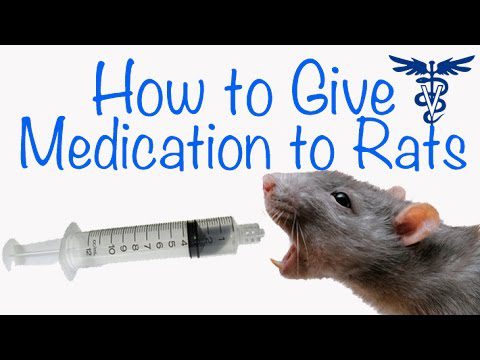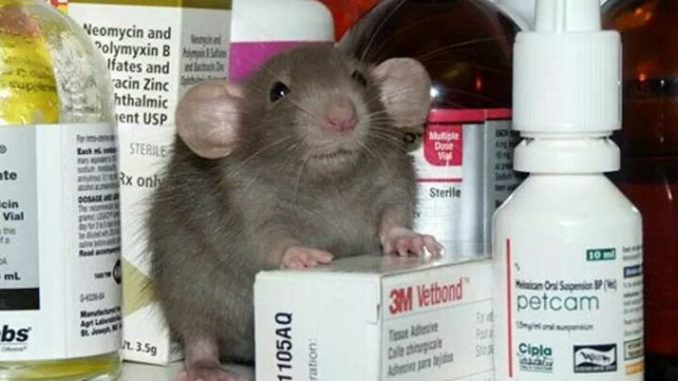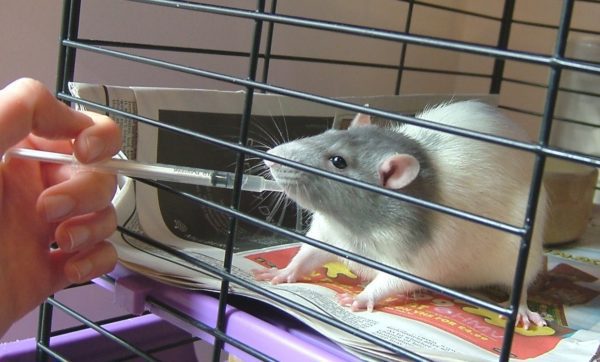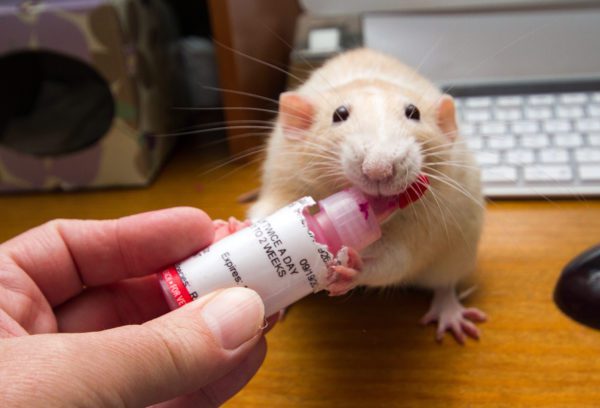
Antibiotics and preparations for domestic rats: use and dosage

Decorative rats during their life often fall ill with infectious and non-contagious diseases, which, due to the accelerated metabolism of rodents, are characterized by a rapid course, the development of irreversible consequences and often the death of a pet. When buying a fluffy pet, novice rat breeders are advised to find competent rodentologists in their city – veterinarians specializing in the treatment of rodents.
IMPORTANT!!! It is strongly not recommended to self-diagnose domestic rats, prescribe the duration and dosage of medicines, advise inexperienced rodent lovers to use oral or injectable drugs without consulting a specialist!
Contents
Principles for calculating the dosage of drugs
It is quite difficult for owners of domestic rats who do not have a veterinary or medical education to calculate the correct dosage of the drug for their beloved pet.
Pet owners get confused in units of measurement or simple mathematical examples, although even an elementary school student can handle such arithmetic operations.
To dose a medicine, you need to know the name of the active substance of a certain drug and its concentration, its dosage for a decorative rat with a specific disease, and the weight of your beloved pet. The same drug can be administered to an animal in different dosages depending on the type and severity of the disease.
Dosages of drugs for rats in veterinary reference books are indicated in mg / kg, for example 10 mg / kg, which means that 10 mg of this agent must be administered for each kilogram of the animal. For an accurate calculation, you need to know the exact weight of the fluffy rodent, if it is not possible to weigh the pet, you can calculate the dosage of the medicine for the average weight of an adult equal to 500 g.
The instructions for each drug indicate the concentration of the active substance in ml of solution, capsule or tablet, it is from it that the amount of a particular drug for a particular animal is calculated, information on the concentration can be indicated on ampoules, vials or blister with tablets. To convert the concentration percentage to mg/kg, multiply this value by 10.

An example of calculating the dose of the drug
Calculate the dose of a common veterinary drug Baytril 2,5% for a rat weighing 600 g:
- The active substance of this drug is Enrofloxacin, its concentration in 1 ml of solution can be determined by the percentage value of 2,5% * 10 = 25 mg / kg or according to the instructions, which indicate that 1 ml of the drug contains 25 mg of the active substance;
- According to the veterinary reference book, we find the dosage of Enrofloxacin for domestic rats, which is 10 mg / kg;
- We calculate the dose of medicine for a rodent weighing 600 g 10 * 0,6 = 6 mg;
- We calculate the amount of Baytril 2,5% solution for a single injection 6/25 = 0,24 ml, draw 0,2 ml of the drug into the insulin syringe.
Calculate the dose of the drug Unidox Solutab in tablets of 100 mg for a 600 g rat:
- The active substance of this drug is Doxycycline, on the packaging and in the instructions for the drug it is indicated that 1 tablet contains 100 mg of the active substance.
- According to the veterinary reference book, we find the dosage of Doxycycline for domestic rats, which is 10-20 mg / kg, depending on the diagnosis, let’s take a dosage of 20 mg / kg;
- We calculate the dose of medicine for a rodent weighing 600 g 20 * 0,6 = 12 mg;
- We count on how many parts it is necessary to divide the tablet 100/12 = 8, it is necessary to grind one tablet of the drug into powder between two spoons, divide it into 8 equal parts and give the animal one part for each dose.
When treating a pet at home, the owner of a domestic rat must strictly observe the dosage and frequency of administration of the drug according to the instructions of a veterinarian in order to avoid poisoning the animal or making the disease chronic.
The main groups of drugs used in the treatment of domestic rats
Antibacterial drugs
The action of antibiotics is aimed at inhibiting the vital activity of bacteria living in the soft and bone tissues and blood of the animal, antibacterial agents are prescribed for serious indications. The widespread use of antimicrobial drugs in decorative rats is associated with a high predisposition of rodents to infectious and non-communicable diseases and the rapidity of the course of pathological processes; antibacterial agents are prescribed for mycoplasmosis, tuberculosis, pneumonia, rhinitis, otitis media, pyelonephritis, abscesses and other common diseases.
The selection of a specific drug should be carried out after determining the sensitivity of the pathogen to the drug by inoculation on nutrient media.
Pathogenic microorganisms develop resistance to a certain active substance, therefore, during treatment, the specialist uses an alternation of antibacterial drugs, prescribing long drug courses of 10-21 days with a double administration of an antibiotic.
It is necessary to carefully use antibiotics for penicillin rats, which can cause anaphylactic shock in a rodent.

Baitril
A broad-spectrum antimicrobial drug, the active ingredient of which is Enrofloxacin, is available in 2,5%, 5%, and 10% solution. In domestic rats, it is used at a dosage of 10 mg / kg 2 times a day for respiratory diseases, diseases of the digestive and genitourinary systems, and secondary infections. Analogues: Enroflon, Enroxil, Enrofloxacin.
Cyprolet
A broad-spectrum antimicrobial drug, the active ingredient Ciprofloxacin, is available in tablets of 0,25, 0,5 and 0,75 g and 0,2% and 1% solution. Decorative rats are prescribed for respiratory diseases and diseases of the genitourinary system at a dosage of 10 mg / kg 2 times a day. Analogues: Afenoxim, Cipro, Quintor, Tsifran, Medotsiprin, etc.
Azithromycin
A modern antibacterial drug with a wide spectrum of action, has a pronounced bactericidal effect, is available in tablets of 0,125 g, 0,5 g, capsules of 0,5 g, in rats it is widely used in the treatment of diseases of the respiratory system at a dosage of 30 mg/kg 2 times a day. Analogues: Sumamed, Azivok, Azitrox, Sumazid, Azitral, Sumamox, Hemomycin etc.
Gentamicin
A toxic bactericidal antibiotic, available in 2%, 4%, 8% and 12% injections, is prescribed to domestic rats for severe respiratory diseases at a dosage of 2 mg/kg 2 times a day.
Ceftriaxone
A broad-spectrum bactericidal antimicrobial drug, available in powder for intravenous and intramuscular administration, decorative rats are used in the treatment of purulent abscesses and otitis, respiratory diseases at a dosage of 50 mg / kg 2 times a day. Cefaxone analogue.
Doxycycline
A broad-spectrum bacteriostatic antibiotic, available in 100 mg capsules, in domestic rats it is used at a dosage of 10-20 mg / kg 2 times a day for respiratory diseases, diseases of the digestive and genitourinary systems, secondary infections. Analogues: Monoclin, Unidox Solutab, Vibramycin, Bassado.
Tylosin
Gentle bacteriostatic antibacterial drug, available in 5% and 20% solution. For domestic rats, it is prescribed for respiratory tract infections at a dosage of 10 mg / kg 2 times a day.
Antiparasitics
Antiparasitic drugs are prescribed for parasitism in the body of a rat of protozoa, worms and ectoparasites.
Common antiprotozoal agents in rats are baytril and metronidazole, which are prescribed when protozoa are found in the feces of a rodent, which are the causative agents of giardiasis, coccidiosis and other diseases.
An indication for the appointment of anthelmintic drugs is confirmation of the presence of worms in the feces of the animal. Prophylactic deworming for rats is not used due to the high toxicity of these drugs. In case of detection of nematodes, lice, subcutaneous mites in a rat, broad-spectrum drugs are prescribed: Stronghold, Dironet, Lawyer, Otodectin.
Stronghold
The antiparasitic drug, the active ingredient of which is Selamectin, is available in pipettes of different colors; for rats, a remedy with a purple cap is used. The drug is applied to the withers at a dosage of 6-8 mg / kg.
Diuretics
The action of diuretic drugs is aimed at increasing the excretion of fluid from the body by the kidneys. They are prescribed to domestic rats for kidney disease, ascites, and pulmonary edema.
Diuretics, together with urine, remove potassium and sodium necessary for the smooth functioning of the cardiovascular system. Therefore, diuretics are used in short courses strictly according to the doctor’s prescription simultaneously with potassium-sparing drugs.
Trigrim
A diuretic agent, the active ingredient of which is torasemide, is available in tablets of 5 and 10 mg. Domestic rats are prescribed at a dosage of 1 mg/kg to relieve edema of various origins.
Glucocorticosteroids
Glucocorticosteroids (GCS) are a group of steroid hormones produced by the adrenal cortex. GCS have a pronounced anti-inflammatory, antihistamine, anti-shock and immunosuppressive effect, which is successfully used in the treatment of cerebral edema, tumors, pneumonia, and shock conditions. Specialists prescribe glucocorticosteroid preparations in small doses to domestic rats in very short courses.
Metipred
Synthetic glucocorticosteroid hormonal drug, available in tablets of 4 mg and lyophilisate for preparing a solution for intravenous and intramuscular administration, is used in domestic rats at a dosage of 0,5-1 mg / kg, more often one-time, with severe respiratory diseases, anaphylactic and traumatic shock, mycoplasmosis, stroke, oncology.
This article is for informational purposes only and is intended for rat breeders involved in the treatment of intelligent rodents at home. Over time, the list of drugs for various diseases of ornamental rats changes quite quickly. Only a veterinarian should prescribe the actual dosage of a certain drug to a specific animal, depending on the type of pathology and neglect of the disease, preferably an experienced rodentologist.
Video how to put a pill in a syringe
Video how to pour medicine into a rat
The use and dosage of drugs for rats
4.6 (92.73%) 11 votes





